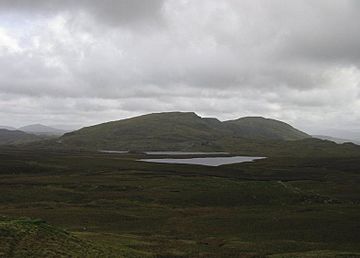Manod Mawr facts for kids
Quick facts for kids Manod Mawr |
|
|---|---|

Manod Mawr North Top and Manod Mawr from Moel Penamnen
|
|
| Highest point | |
| Elevation | 661 m (2,169 ft) |
| Prominence | 266 m (873 ft) |
| Parent peak | Arenig Fach |
| Listing | Marilyn, Hewitt, Nuttall |
| Naming | |
| English translation | great snowdrift |
| Language of name | Welsh |
| Geography | |
| Location | Gwynedd, Wales |
| Parent range | Moelwynion |
| OS grid | SH723446 |
| Topo map | OS Landranger 124 |
Manod Mawr is a mountain in North Wales. It is part of a group of mountains called the Moelwynion. Sometimes, people also call these mountains the Ffestiniog hills. Manod Mawr is known for its history of quarrying and a secret role it played during World War II.
Manod Mawr: A Mountain with a Secret
Manod Mawr is a mountain in the beautiful region of North Wales. It stands tall as part of the Moelwynion mountain range. This area is famous for its stunning views and rugged landscapes. The name "Manod Mawr" comes from the Welsh words meaning "great snowdrift."
A Mountain Shaped by Quarries
For many years, Manod Mawr was a very busy place because of its quarries. A quarry is a large pit dug into the ground to get out stone or slate. The Graig Ddu Quarry, which is now closed, was located on this mountain. It created a big hollow between Manod Mawr's main peak and another nearby peak called Manod Mawr North Top.
Part of Manod Mawr's summit is just outside the special protected area of Snowdonia National Park. However, the summit of Manod Mawr North Top is not inside the park. There were once worries that the quarry might eventually remove the North Top completely.
A Secret Hiding Place During World War II
During the Second World War, something very interesting happened at Manod Mawr. The tunnels inside the mountain's quarries were used for a top-secret mission. Valuable paintings from the National Gallery in London were brought here. These artworks were hidden deep inside the mountain to keep them safe from bombs and damage during the war. It was a clever way to protect important pieces of art history!
 | Madam C. J. Walker |
 | Janet Emerson Bashen |
 | Annie Turnbo Malone |
 | Maggie L. Walker |

